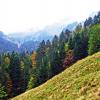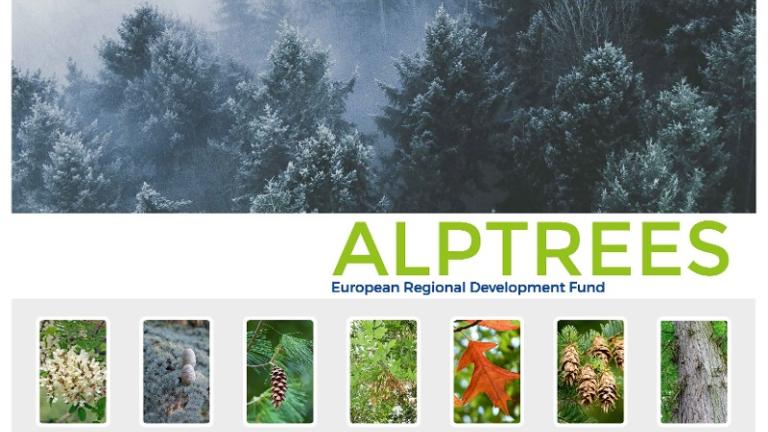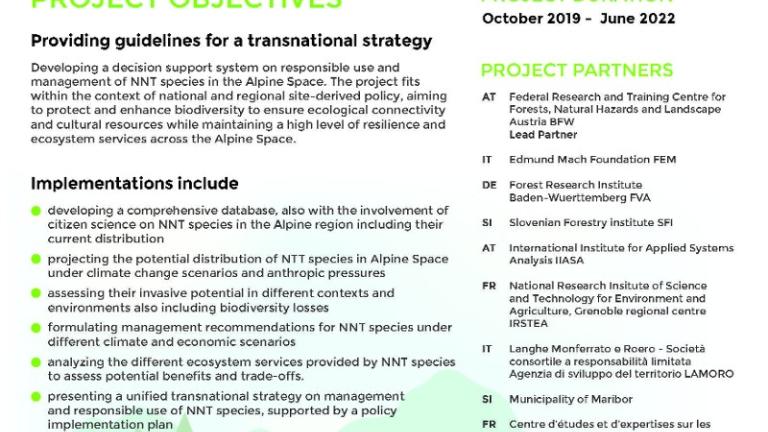
A Transnational Cooperation for Sustainable Use and Management of Non-Native Trees in Urban, Peri-Urban and Forest Ecosystems in the Alpine Region.
 © IIASA
© IIASA
Introduction
ALPTREES aims to develop a transnational strategy for the responsible use and management of non-native trees in the Alpine Space with the help of an integrated Decision Support System. The project fits within the context of national and regional site-derived policy aiming to protect and enhance biodiversity to ensure ecological connectivity and cultural resources while maintaining a high level of resilience and ecosystem services across the region.
Overview
The expected benefits and potential risks of non-native trees (NNT) to European geographic regions have polarised the opinions of experts and citizens. Benefits include adaptation to climate change (CC), contributions to bioeconomy, urban and peri-urban green infrastructure and mitigation of natural hazards by NNT, while risks involve NNT invasiveness and effects on native biodiversity. In critical and vulnerable ecosystems such as the Alpine Space (AS), such risks and benefits must be carefully considered before management decisions are made. Many efforts have already been undertaken to manage the risks, but neither European or national/regional recommendations and strategies for NNT management in the AS that consider the challenges of CC yet.
The common territorial challenge is to identify current and future benefits and negative impacts of NNT. Currently, 4% of the European forest area (8.5mio ha) are coved with over 150 different NNT species. Furthermore, NNT are planted in high numbers and cultivated as ornamentals especially in urban and peri-urban areas. Comprehensive risk analysis on CC and NNT has led to an incoherent patchwork of local strategies for NNT.
Given the challenges in NNT management with respect to both benefits and risks, a transnational approach is needed to qualify the role of NNT in future AS ecosystems. Therefore, ALPTREES will provide a transnational strategy for the responsible use and management of NNT in the AS with the help of an integrated Decision Support System (DSS) and formulate management recommendations for NNT under different climate and economic scenarios through stakeholder meetings, policy briefs, a handbook of lessons learned and transnational pilot actions for best management practices.
An innovative output of the project is the Open ALPTREES Knowledge Hub, that will support the transnational and interdisciplinary knowledge transfer.
Objective
The overall objective of ALPTREES is to improve knowledge-based decision-making on the responsible use and management of NNT in the AS by developing a transnational strategy on NNT. This strategy will evaluate the tradeoffs between promoting climate change adaptation through planting adapted NNT while preserving and enhancing the biodiversity, ecosystem services and cultural resources of native forests. Based on scientific analysis, ALPTREES' strategy of sharing knowledge on challenges and best practices as well as the establishment of a transnational network to learn from each other and take advantage of synergies will significantly contribute to the protection, conservation and connectivity of Alpine Space ecosystems.
IIASA’s role will be to model future potential and risks for NNT under different climate change scenarios for the AS, particularly for the forest and peri-urban region. The results of the project will increase the level of sustainable valorisation of cultural and natural heritage in the AS by providing tools allowing stakeholders in the sectors forestry, nature conservation, timber industry, and rural & urban planning to distinguish between negative and positive impacts of NNT species on ecosystem services and functional needs in urban, peri-urban and rural areas. The transnational cooperation strategy will provide technical guidelines for CC adaptation decision-making tools & planning to safeguard the future of green infrastructure, biodiversity functions and ecosystem services in the entire EUSALP territory. ALPTREES will enhance knowledge transfer through capacity building.
More information: https://www.alpine-space.eu/project/alptrees/




